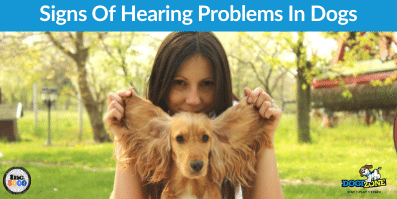Signs Of Hearing Problems In Dogs
Just like people, dogs can have changes in their ability to hear as they age. There are also a number of medical conditions, diseases, and injuries that can cause hearing problems for dogs. 
September 22-28 is Deaf Pet Awareness Week, and this is an ideal time to brush up on your understanding of the signs your dog may be experiencing a loss of hearing. Recognizing the signs can help you to schedule an appointment with your vet to determine if the issue is health-related and treatable or a permanent change in your dog’s hearing.
Signs of Hearing Problems in Dogs
All dogs age slightly differently, with large and giant breeds having a shorter lifespan on average than middle to small dogs. Specific breeds are also more likely to have hearing problems, with Dalmatians, German Shepherd Dogs, Miniature and Toy Poodles, Boston Terriers, and Border Collies some of those breeds.
Specific genetic conditions can cause deafness at birth. This congenital type of deafness is linked to specific genetic factors. White dogs, white dogs with some spotting (piebald coloration), and merle coat patterns (blacks, blues, gray, and white), have a higher rate of congenital hearing loss. In most cases, these dogs will be identified within a few weeks of life as they do not respond the same as puppies with normal hearing.
Other than the congenital hearing loss that is discovered early, signs of hearing loss in adult dogs include:
- Trauma to the ear – injuries to the ear area are often linked to hearing loss, although it may only impact the injured side of the head
- Lack of recall – if you dog does not come back when called, or does not return to a whistle after doing this successfully in the past, check his or her hearing. When the dog is looking another direction and in close proximity, say the dog’s name or make a noise. If he or she does not respond, it may be a hearing loss issue.
- Startling easily – dogs that have hearing loss do not hear people or other dogs or pets approaching. This can lead to a sudden startle when they are touched or something brushes against them.
- Lack of interaction – some dogs become more withdrawn when they can no longer hear what is going on around them. They may sleep more, show disinterest in play, or be unwilling to go far from you when outside or at the dog park.
See Your Vet
If you notice changes in your dog’s behavior that are similar to the signs above, schedule an appointment with your vet. He or she will examine the dog and check for medical issues, neurological problems, or other factors that may be impacting your dog’s ability to hear.
Sometimes, ear wax buildup, ear infections, or other types of medical issues can be the cause of hearing loss, even in older dogs. Treating these issues can improve or fully restore your dog’s hearing, allowing them to continue to interact fully with the world around them.

